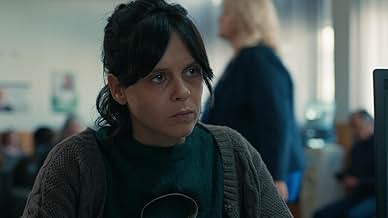Adicionar um enredo no seu idiomaIn a coastal town, psychologist Júlia Mendes and inspector Pedro Sousa investigate a young girl's murder. Their probe unveils concealed truths, blurring boundaries between love and violence ... Ler tudoIn a coastal town, psychologist Júlia Mendes and inspector Pedro Sousa investigate a young girl's murder. Their probe unveils concealed truths, blurring boundaries between love and violence justification.In a coastal town, psychologist Júlia Mendes and inspector Pedro Sousa investigate a young girl's murder. Their probe unveils concealed truths, blurring boundaries between love and violence justification.
- Prêmios
- 1 indicação no total
Explorar episódios
Avaliações em destaque
The first episode was confusing, flitting from one scenario to another. I didn't know where I was at times. However, as it concluded and the second episode began, everything started to gel together.
That is, except for the parallel story to the murder of Luisa, the disappearance of young children taken from their mothers by what appeared to be a fake social worker.
I found this aspect of the story hard to believe. Some of the kidnapped babies belonged to parents with chaotic lifestyles who might have signed anything but others didn't. I don't think they'd have signed their rights away without a court order.
The other aspect of this, as pertains to the series, is why is this story grafted on? Not until episode four do we get an inkling. In fact, it's not an inkling but a huge, shrieking clue and I was in no doubt as to who was responsible from then on. As the series moved on, more clunking dialogue yelled to us who the baddies were.
All the while, the other investigation is going on in fits and starts but not until the very end do we find out the culprit in the murder case.
I watched it all and am not angry with myself for having done so. However, I cannot agree that this is a milestone in Portuguese television drama. It was interesting enough but the histrionics on display were over the top and so many protocols were ignored that we were in fantasyland, not in any real world.
No more than a four star review, I'm afraid.
That is, except for the parallel story to the murder of Luisa, the disappearance of young children taken from their mothers by what appeared to be a fake social worker.
I found this aspect of the story hard to believe. Some of the kidnapped babies belonged to parents with chaotic lifestyles who might have signed anything but others didn't. I don't think they'd have signed their rights away without a court order.
The other aspect of this, as pertains to the series, is why is this story grafted on? Not until episode four do we get an inkling. In fact, it's not an inkling but a huge, shrieking clue and I was in no doubt as to who was responsible from then on. As the series moved on, more clunking dialogue yelled to us who the baddies were.
All the while, the other investigation is going on in fits and starts but not until the very end do we find out the culprit in the murder case.
I watched it all and am not angry with myself for having done so. However, I cannot agree that this is a milestone in Portuguese television drama. It was interesting enough but the histrionics on display were over the top and so many protocols were ignored that we were in fantasyland, not in any real world.
No more than a four star review, I'm afraid.
Irreversível is a very well organised and structured television series, and I cried and got goosebumps several times. It's amazing what the Portuguese can produce with so little investment in these projects. The location where it is filmed, Figueira da Foz (I think), is very beautiful and serene and the production photography has done an excellent job. The soundtrack is also very good and coherent with the emotional weight of the themes addressed. Excellent performances from Miguel Amorim and Helena Caldeira, some of the best actors of the new Portuguese generation. And what can we say about Paula Magalhães, who at 31 managed to play a 17-year-old girl?
Cons: there's a scene at the beginning where the inspector is smoking on a cliff and drops his cigarette butt on the ground.... ridiculous, and in Portugal it's a misdemeanour! Apart from that, I found the performance of Margarida Vilanova (a psychologist and grieving mother) too dramatic, her story could have been developed further and her relationship with the inspector could have been explored in more depth, but the production preferred minute-long scenes in which the actress presents herself with a look that is too empty for someone who is still managing to get up every day to help others.
Cons: there's a scene at the beginning where the inspector is smoking on a cliff and drops his cigarette butt on the ground.... ridiculous, and in Portugal it's a misdemeanour! Apart from that, I found the performance of Margarida Vilanova (a psychologist and grieving mother) too dramatic, her story could have been developed further and her relationship with the inspector could have been explored in more depth, but the production preferred minute-long scenes in which the actress presents herself with a look that is too empty for someone who is still managing to get up every day to help others.
*"Irreversível"* is a triumph in Portuguese television drama, marking a high point in national series production. Directed by Bruno Gascon, renowned for his keen visual sense and sensitivity to challenging themes, the show features stunning cinematography that captures both the haunting beauty of Figueira da Foz and the emotional depth of its narrative. The production by Caracol Studios, known for acclaimed works like *Carga* and *Sombra*, shines with meticulous attention to detail, resulting in a high-quality product that competes with international standards.
The cast, led by Margarida Vila-Nova and Laura Dutra, delivers exceptional performances. Vila-Nova's portrayal of Júlia Mendes, a woman consumed by grief and a thirst for justice, is devastatingly authentic, making every scene she appears in a gripping emotional experience. Laura Dutra equally impresses with her dramatic intensity and ability to balance vulnerability and strength, solidifying her status as a breakout talent.
Ana Cristina de Oliveira, an accomplished model and actress, stands out as well, bringing a magnetic presence to the series. Her nuanced performance adds layers of sophistication and mystery, elevating the drama in every scene she graces.
Gascon deserves immense praise for transforming a crime thriller into a profoundly human story, exploring issues such as mental health, bullying, and illegal adoptions with remarkable sensitivity. The pacing and twists keep viewers riveted, a rarity in contemporary television.
However, while the series excels in many aspects, Rafael Morais' performance as Inspector Pedro Sousa is a notable drawback. His delivery often renders dialogue almost incomprehensible, requiring subtitles to fully grasp his character's contributions to the story. This detracts from the overall immersion and is a significant misstep in an otherwise well-executed production.
In conclusion, *Irreversível* is not merely a series; it is a television masterpiece that raises the bar for Portuguese fiction, offering a compelling narrative, exceptional performances, and top-tier production. A must-watch for fans of emotionally resonant drama, despite its minor flaws.
The cast, led by Margarida Vila-Nova and Laura Dutra, delivers exceptional performances. Vila-Nova's portrayal of Júlia Mendes, a woman consumed by grief and a thirst for justice, is devastatingly authentic, making every scene she appears in a gripping emotional experience. Laura Dutra equally impresses with her dramatic intensity and ability to balance vulnerability and strength, solidifying her status as a breakout talent.
Ana Cristina de Oliveira, an accomplished model and actress, stands out as well, bringing a magnetic presence to the series. Her nuanced performance adds layers of sophistication and mystery, elevating the drama in every scene she graces.
Gascon deserves immense praise for transforming a crime thriller into a profoundly human story, exploring issues such as mental health, bullying, and illegal adoptions with remarkable sensitivity. The pacing and twists keep viewers riveted, a rarity in contemporary television.
However, while the series excels in many aspects, Rafael Morais' performance as Inspector Pedro Sousa is a notable drawback. His delivery often renders dialogue almost incomprehensible, requiring subtitles to fully grasp his character's contributions to the story. This detracts from the overall immersion and is a significant misstep in an otherwise well-executed production.
In conclusion, *Irreversível* is not merely a series; it is a television masterpiece that raises the bar for Portuguese fiction, offering a compelling narrative, exceptional performances, and top-tier production. A must-watch for fans of emotionally resonant drama, despite its minor flaws.
Principais escolhas
Faça login para avaliar e ver a lista de recomendações personalizadas
Detalhes
- Cor
Contribua para esta página
Sugerir uma alteração ou adicionar conteúdo ausente

Principal brecha
By what name was Irreversível (2024) officially released in Canada in English?
Responda


































